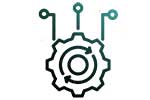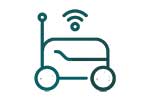Cohort challenges
The RAINZ CDT programme follows a cohort-based training and research model, designed to ensure that graduates are not only subject matter experts, but also equipped with highly valuable skills in teamwork, systems integration, industrial engagement and commercialisation.
Cross-sector challenges
Each cohort will be recruited to conduct research directed towards an industry co-created cross-sector challenge. These challenges will be unique to each cohort, ensuring a dynamic and evolving research experience.
To solve these challenges will require a multi-disciplinary team of engineers and scientists who will explore different aspects, which will then be integrated through the RAINZ CDT annual research sprints.
-

Cohort 1 (Start September 2025)
Autonomous physical interactions in constrained environments:
How can robots move beyond inspections and start to interact with their environment, such as picking up items, turning valves or switches, or performing maintenance or repair activities?
-

Cohort 2 (Start September 2026)
Long-term autonomous monitoring and maintenance of assets:
How can robots operate for long periods of time (months or years) with minimal human interactions in complex environments?
Please note: this challenge is subject to change.
-

Cohort 3 (Start September 2027)
Safe co-existence with human operators:
Humans and robots will always work together, but how can this be achieved in a way that is safe to everyone?
Please note: this challenge is subject to change.
-

Cohort 4 (Start September 2028)
Operation in highly dynamic environments:
As we move away from well defined, static environments, how will robots be able to operate in unknown environments that could change very rapidly?
Please note: this challenge is subject to change.




